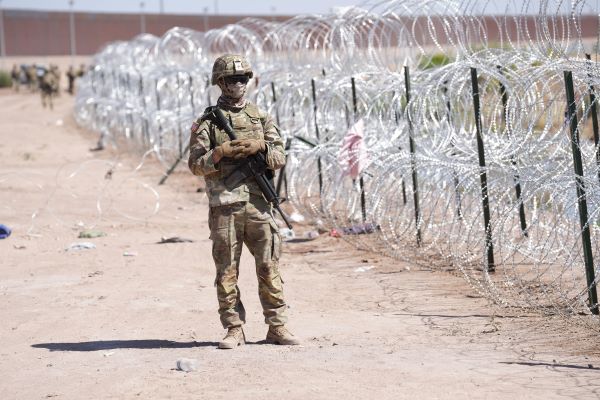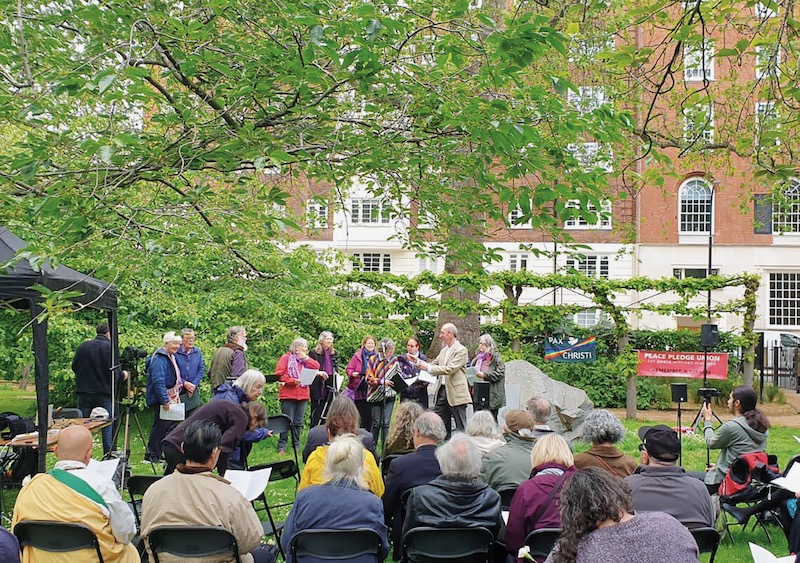The birth of a three-parent baby has been criticised by Bishop John Sherrington, the lead on life issues for the Bishops’ Conference of England and Wales.
He said: “The recent news that a ‘three parent baby’ had been born through the use of ‘mitochondrial donation treatment’ is deeply concerning”, adding that it “shows a further step in the technical manipulation of new life with the loss of human life as part of the technique”.
In a statement, the bishop explained: “The technique depends on the destruction of two human lives who had inherent dignity and rights and must be protected from their creation as persons in order to create a third embryo and life. It also fractures the child from biological parenthood.
“It steps into the unknown world of genetic engineering with manipulation of the human germline.”
Bishop Sherrington’s view was supported by the Anscombe Bioethics Centre which also warned of the potential for “serious unintended consequences”.
Scottish faith leaders met with providers of social care at the Conforti Institute on 11 May to highlight the crisis in social care. The “Scottish Faith Leaders Declaration on Low Pay in Social Care” was launched, signed by Archbishop William Nolan of Glasgow – the president of Justice and Peace Scotland – and Revd Dr Iain Greenshields, moderator of the General Assembly of the Church of Scotland.
They encouraged bishops, clergy and all ordained to add their names and support the call for justice, dignity and respect to be shown to both those cared for and those in caring roles in the community.
The declaration will be presented to the Scottish government in the coming weeks. They called on the government to work towards all frontline social care workers receiving a minimum of £12 per hour and to make appropriate funding available to allow all social care staff to be recognised for their skills, experience and contributions, in whichever role they serve.
Christian peace groups supported the national ceremony on Monday to mark International Conscientious Objectors’ Day in front of the memorial stone for conscientious objectors in Tavistock Square, London. These included Pax Christi England and Wales, Scotland Justice and Peace, Anglican Pacifist Fellowship, Fellowship of Reconciliation and Quaker Peace and Social Witness.
Around 500 people have signed a petition to save an ancient beech tree from being felled for development plans of Ripon Cathedral. It is to be submitted to North Yorkshire Council.
The application proposes erecting a two-storey building on Minster Gardens, which would require the loss of the tree and ten other trees on site. Campaigners deplored the loss of habitat and said: “We believe there are alternative solutions, including the utilising of pre-existing buildings.”
The petition is supported by Jack Taylor, the Woodland Trust’s lead campaigner for woods under threat and North Yorkshire council’s principal ecologist, Dan McAndrew.
A spokesperson for Ripon Cathedral said: “The building will be an asset to the people of the city, providing much needed facilities, including a safe space for our choristers to rehearse that is fully accessible, along with public toilet facilities.”
Aid to the Church in Need will present a petition to the Conservative MP Fiona Bruce, the prime minister’s special envoy for freedom of religion and belief, on 5 June, demanding justice for the victims of an attack on a church in Nigeria last year.
IS-linked militants killed 41 and injured more than 70 others with guns and bombs during Mass on Pentecost Sunday at St Francis Xavier’s Church, Owo. The charity will present the petition – backed by Bishop Jude Arogundade of Ondo – on the first anniversary of the massacre, calling on the UK government to demand action from its Nigerian counterparts.
J.R.R. Tolkien was moved to tears as he wrote the concluding passages of The Lord of the Rings, according to the critic and theologian Fr Michael Ward, reflecting his idea of the “eucatastrophe” – a moment of total disaster in which grace rather than effort brings victory.
Speaking at St Mary’s Church, Hampstead, on the theological imagination of Tolkien and C S Lewis, Fr Ward said that pages of the Lord of the Rings manuscript were stained with the author’s tears. The narrative trope of eucatastrophe, said Fr Ward, was rooted in the gospels, in which the disaster of Good Friday is miraculously rescued at Easter.
Columban Missionaries in Britain are celebrating Laudato Si’ Week by following in the footsteps of St Columban to reflect on “the cry of the Earth and the cry of the poor”, cited in the 2015 Laudato Si’ encyclical of Pope Francis.
A pilgrim group of ordained and lay Columban missionaries and friends, led by director Fr John Boles, will walk from Padstow to Fowey in Cornwall over 24-27 May. Others can take part by becoming virtual pilgrims, joining the walk or sponsoring.
The pilgrims will draw inspiration from St Columban, who crossed Cornwall when he embarked on his missionary journey to Europe more than 1400 years ago. They are also celebrating visiting parishes in the diocese of Plymouth during 2023 for mission appeals.
The Catholic Union will be hosting a webinar on 20 June with Fr Mark Vickers on his book, God in No 10: The Personal Faith of the Prime Ministers, from Balfour to Blair. It will feature a discussion between the author, a priest of Westminster Archdiocese, and Catholic Union Deputy Director, James Somerville-Meikle.
God in No 10 is an account of the personal faith of the twentieth-century British prime ministers. “Surprisingly, no one had ever covered the Prime Ministers' personal faith,” says Fr Vickers, adding, “there are many surprises challenging received wisdom: sceptics and seances in the early twentieth century; increasingly devout Christians in the later period.”
Victims of global migration who died in May last year were remembered by around 25 people at Monday’s monthly prayer vigil outside the Home Office in London. These included the names of 76 people whose boat sank in the Mediterranean off Tunisia in May 2022.
Deaths are listed if they can be related to border closure, push backs, asylum laws, detention policy and deportations. The vigil was organised by the London Catholic Worker, the Diocese of Westminster Justice and Peace Commission and the London Churches Refugee Fund.
One of the organisers, Barbara Kentish, told The Tablet: “Every month we pray in front of the UK Home Office that our country can begin to welcome the human as a neighbour and not as a threat. Our collective failure to welcome the stranger, as commanded by Jesus, demands our prayers of repentance.”
This year’s annual lecture at the Jesuit Centre for Faith and Justice focused on homelessness.
In her address in the Ignatian chapel of Gardiner Street Jesuit Residence in Dublin, Dr Suzanne Mulligan, a moral theologian from the Pontifical University in Maynooth, drew on Catholic Social Teaching. She highlighted how Pope Francis has identified as “new forms of poverty” which structurally exclude groups of people from the opportunities that others in society have access to.
“Homelessness: Theologically Understood” addressed issues around the systemic discrimination, dehumanisation and trauma that people who lose their homes face in society, and why it is a grave affront to their dignity.
Peter Williams is moving from his role as media and communications manager at the Anscombe Bioethics Centre to become director of the Family Education Trust, a national educational trust which researches the causes and consequences of family breakdown, from mid-June. Between 2011 and 2020 he was executive officer of the campaigning organisation Right To Life. He succeeds long-time director Norman Wells, who died suddenly in Spring 2020.
Ireland’s current approach to international protection of migrants is “not fit for purpose” according to members of the Migrations in Our Common Home round table.
In its latest policy brief, the group, which includes Social Justice Ireland’s Fr Seán Healy, said it is time to move away from a for-profit model which maximises profit over conditions, to an integrated, not-for-profit model where government works collaboratively with stakeholders within a clear set of national standards.
In a statement, the group said migration needs to be better understood and they called for a publicity campaign to highlight the positive aspects of migration and integration and to challenge racism.
“Migration is neither temporary nor a one-off event. In a globalised society, we must plan for migration as part of demographic change,” the group said.
Planning for the future population requires an understanding of the needs of all those who make up society and the supports they may need over their lives. Calling for a human-rights-based approach where everyone in society has a right to access appropriate accommodation, services and infrastructure, members said these rights must be available to all.
The statement was issued in the wake of a confrontation between anti-immigration protesters and Gardaí at the weekend. A group opposed to asylum seekers marched to the International Protection Office in Dublin and destroyed tents in which a group of homeless asylum seekers had been living.



 Loading ...
Loading ...